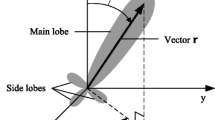Abstract
Power consumption is an important issue in the wireless ad hoc networking environment. In this paper, we present several energy-efficient routing algorithms using directional antennas for wireless ad hoc networks. These algorithms are simple to implement and are distributed and can be applied to mobile environments. We evaluate how directional antennas improve system throughput. We study the influence of the battery recovery effect and mobility on the network throughput during a network lifetime. We also present an algorithm that exploits the broadcast nature of the wireless communication environment to improve end-to-end bit error performance for a Rayleigh fading channel.
Similar content being viewed by others
REFERENCES
Young-Bee Ko and N. H. Vaidya, Geocasting in mobile ad hoc networks: Location-based multicast algorithms, Proc. WMCSA '99, pp. 101–110, 1999.
Young-Bae Ko, V. Shankarkumar, and N. H. Vaidya, Medium access control protocols using directional antennas in ad hoc networks, Proc. Infocom 2000, Vol. 1, pp. 13–21, 2000.
S. Singh, M. Woo, and C. S. Raghavendra, Power-aware routing in mobile ad hoc networks, Fourth Annual ACM/IEEE International Conference on Mobile Computing and Networking, pp. 181–190, Dallas, Texas, 1998.
M. Ettus, System capacity, latency, and power consumption in multihop-routed SS-CDMA wireless networks, Radio and Wireless Conference (RAWCON) 98, pp. 55–58, Colorado Springs, Colorado, 1998.
Volkan Rodoplu and Teresa H. Meng. Minimum energy mobile wireless networks. IEEE Journal on Selected Areas in Communications, Vol. 17, No. 8, pp. 1333–1344, 1999.
Jae-Hwan Chang and L. Tassiulas, Energy conserving routing in wireless ad-hoc networks, Proc. Infocom 2000, Vol. 1, pp. 22–31, 2000.
C. F. Chiasserini and R. Rao, Routing protocols to maximize battery efficiency, Proc. MILCOM 2000, Vol. 1, pp. 496–500, 2000.
C. F. Chiasserini and R. Rao, Stochastic battery discharge in portable communication devices, The Fifteenth Annual Battery Conference on Applications and Advances, pp. 27–32, 2000.
B. W. Parkingson and J. J. Spilker, Global positioning system: Theory and applications, Vol. I, American Institute of Aeronautics and Astronautics, Washington, DC, 1996.
P. Gupta and P. R. Kumar, The capacity of wireless networks, IEEE Transactions on Information Theory, Vol. 46, No. 2, pp. 388–404, March 2000.
M. Grossglauser and D. Tse, Mobility increases the capacity of ad-hoc wireless networks, Proc. Infocom 2001, Vol. 3, pp. 1360–1369, 2001.
C. F. Chiasserini and R. Rao, Energy efficient battery management, Proc. INFOCOM 2000, Vol. 2, pp. 396–403, 2000.
D. G. Brennan, Linear diversity combining techniques, Proc. IRE, Vol. 47, pp. 1075–1102, 1959.
Author information
Authors and Affiliations
Rights and permissions
About this article
Cite this article
Wang, K., Proakis, J.G. & Rao, R.R. Energy-Efficient Routing Algorithms Using Directional Antennas for Mobile Ad Hoc Networks. International Journal of Wireless Information Networks 9, 105–118 (2002). https://doi.org/10.1023/A:1015303800432
Issue Date:
DOI: https://doi.org/10.1023/A:1015303800432




